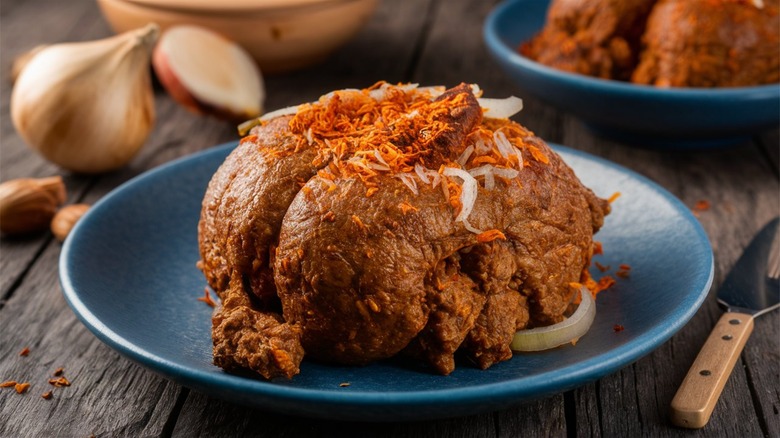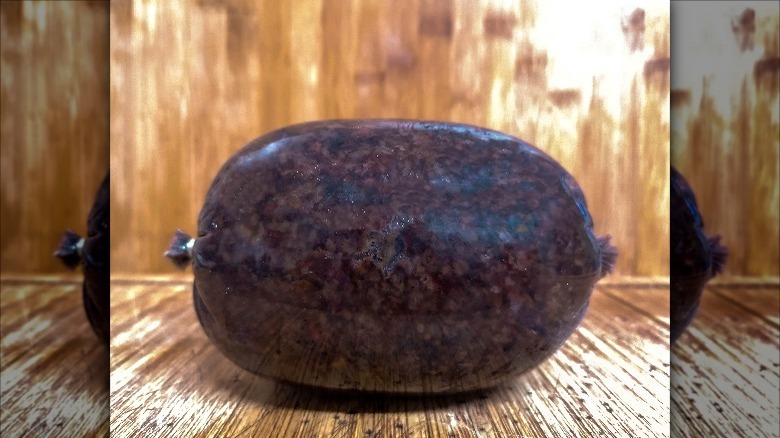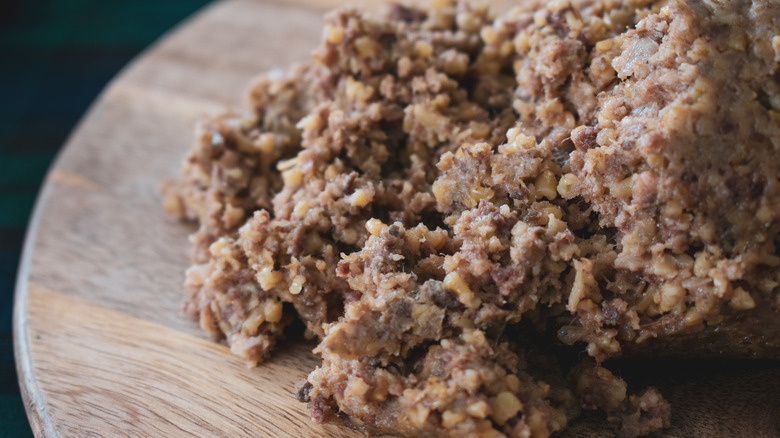The Reason Haggis Is Banned In The US
Haggis, the national dish of Scotland, was first documented in the 1400s, and where eaten, it's commonly part of a breakfast spread, the way meatloaf once was. It's also traditionally eaten on Burns Night, January 25th, to celebrate the famous Scottish poet Robert Burns. But if you're in the U.S. and want to have a proper Burns Night — besides needing to know the difference between regular whiskey and a proper Scotch whisky — you'll need to find a way around procuring traditional haggis, because a single ingredient renders it problematic here.
Haggis is made from sheep offal, beef or mutton suet (the fat around kidneys), onion, oatmeal, and a multitude of spices such as cayenne pepper. The mixture is then stuffed inside a sheep's stomach. Although that last ingredient may be sending up red flags as to why it's banned, it's actually the presence of lung meat that keeps it from our shores. Offal meat is a mixture organ meat and, in the case of haggis, it contains sheep lung. However, since the 70s, American Scots have been prevented from enjoying their national, ancestral dish.
Why is lung meat banned in the US?
In 1971, the USDA banned the sale of animal lungs for human consumption because they were deemed unsafe (though, interestingly, pets are still allowed to eat them). One of the rationales behind the ban is that when the animal is slaughtered some of the stomach flora can move up into the lung. And in the U.S., The Food Safety and Inspection Service has a zero-tolerance policy on such things in meat products because it can spread disease and make consumers ill.
Animal lungs may also contain microorganisms that the animal inhaled while alive. As the animal breathes, the lung filters out all kinds of pollen and fungal spores, These microorganisms can spread disease if not cooked thoroughly; lung meat has a tendency to turn hard when well done, which can lead to undercooking and increases the risk related to ingesting them.
Will authentic haggis ever be available in the US?
Although you can buy versions of haggis in the U.S., it won't contain the traditional ingredients of its Scottish counterpart, like sheep lung. However, there has been some movement towards the real thing being allowed stateside.
In 2023, Dr. Jonathan Reisman petitioned the USDA asking to rescind its ban on lung meat in the U.S. Writing in the New York Times, Dr. Reisman states that "a basic understanding of how our lungs clean themselves suggests how nonsensical the Department of Agriculture rule is." Reisman's point is that humans [and animals] are already ingesting impurities and microorganisms that our lungs filter out of the air. Mucus removes the impurities from the lungs, moves to the throat and then we swallow it. Plus, he notes, almost all other developed countries don't have a ban on lung meat. This petition comes hot on the heels of a move the Biden administration made in 2022 to lift a ban on U.K. sheep meat, which was banned in the U.S in 1989 due to a mad cow disease outbreak in the U.K – yes, lots of bans.
But hold your horses ... or sheep. Despite the ban on U.K. sheep meat being lifted, it doesn't mean haggis will be readily available anytime soon. While the U.S. is close to being able to celebrate Burns Night with a traditional haggis — and a wee dram of drambuie, if the notion takes you – the lung meat ban is still in effect. But, it looks like things are moving in the direction of being able to sample it at home.


